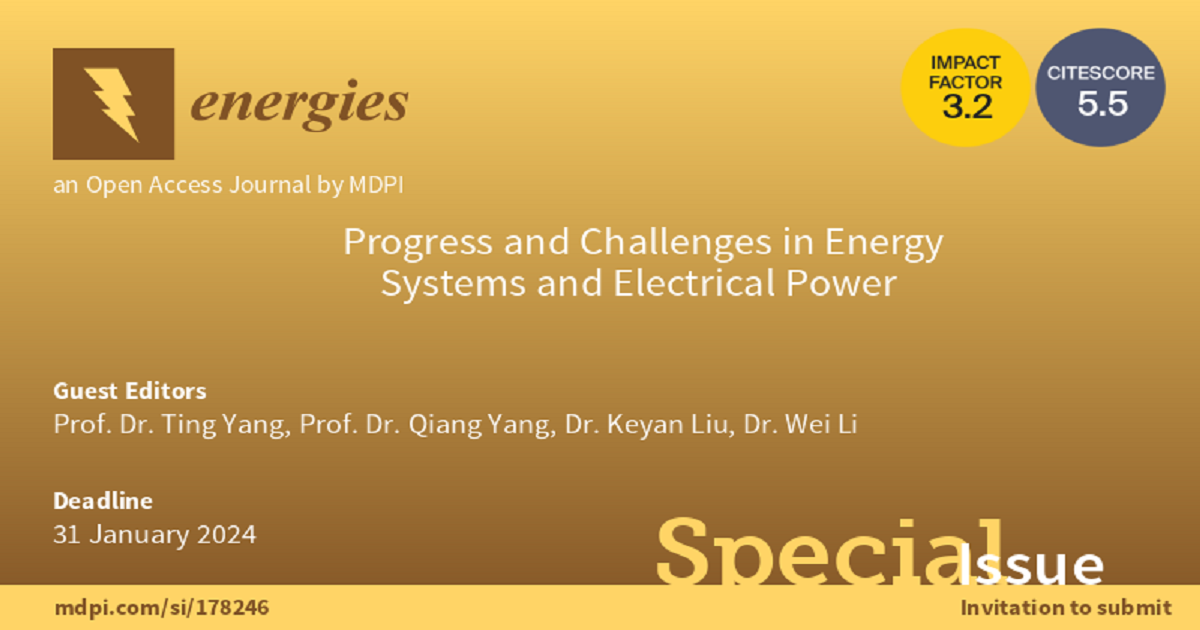- 3.2Impact Factor
- 7.3CiteScore
- 17 daysTime to First Decision
Progress and Challenges in Energy Systems and Electrical Power
This special issue belongs to the section “F: Electrical Engineering“.
Special Issue Information
Dear Colleagues,
We are pleased to invite you to submit your article from ICESEP 2023 to this Special Issue, entitled “Progress and Challenges in Energy Systems and Electrical Power”, in the open-access journal Energies (IF 3.2). Papers originating from other communities are also welcome.
ICESEP 2023 aims to bring together innovative academics and industrial experts in the field of energy systems, electrical engineering and power engineering. The primary goal of this conference is to promote research and developmental activities in energy engineering, electrical engineering and power engineering, as well as to promote scientific information interchange between researchers, developers, engineers, students, and practitioners working all around the world.
Topics of interest for this Special Issue include, but are not limited to, the following:
Energy saving technologies;
Energy storage technologies;
Renewable energy;
Thermal and power engineering;
Energy engineering;
Renewable energy technologies and systems;
Wind power;
Solar-related technologies;
Alternative fuels;
Nuclear power technology;
Thermal engineering and thermodynamics;
Smart grid/power IC
Cyber physical power system;
Artificial intelligence and energy internet;
Power system-wide area perception and advanced metering infrastructure;
Energy internet and carbon reduction;
Power machinery and engineering;
Electric vehicles and smart grids;
Electrical energy processing;
Power systems and automation;
High voltage and insulation technology;
Electric motors and electrics;
Electrical engineering theory and new technologies.
Prof. Dr. Ting Yang
Prof. Dr. Qiang Yang
Dr. Keyan Liu
Dr. Wei Li
Guest Editors
Manuscript Submission Information
Manuscripts should be submitted online at www.mdpi.com by registering and logging in to this website. Once you are registered, click here to go to the submission form. Manuscripts can be submitted until the deadline. All submissions that pass pre-check are peer-reviewed. Accepted papers will be published continuously in the journal (as soon as accepted) and will be listed together on the special issue website. Research articles, review articles as well as short communications are invited. For planned papers, a title and short abstract (about 250 words) can be sent to the Editorial Office for assessment.
Submitted manuscripts should not have been published previously, nor be under consideration for publication elsewhere (except conference proceedings papers). All manuscripts are thoroughly refereed through a single-blind peer-review process. A guide for authors and other relevant information for submission of manuscripts is available on the Instructions for Authors page. Energies is an international peer-reviewed open access semimonthly journal published by MDPI.
Please visit the Instructions for Authors page before submitting a manuscript. The Article Processing Charge (APC) for publication in this open access journal is 2600 CHF (Swiss Francs). Submitted papers should be well formatted and use good English. Authors may use MDPI's English editing service prior to publication or during author revisions.
Keywords
- energy systems
- renewable energy
- electrical power
- power systems
- smart grid
- carbon reduction

Benefits of Publishing in a Special Issue
- Ease of navigation: Grouping papers by topic helps scholars navigate broad scope journals more efficiently.
- Greater discoverability: Special Issues support the reach and impact of scientific research. Articles in Special Issues are more discoverable and cited more frequently.
- Expansion of research network: Special Issues facilitate connections among authors, fostering scientific collaborations.
- External promotion: Articles in Special Issues are often promoted through the journal's social media, increasing their visibility.
- e-Book format: Special Issues with more than 10 articles can be published as dedicated e-books, ensuring wide and rapid dissemination.

